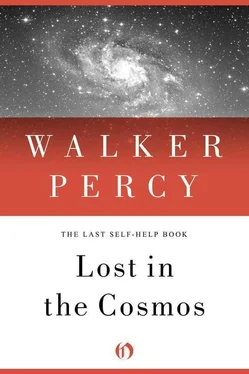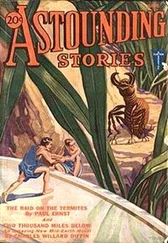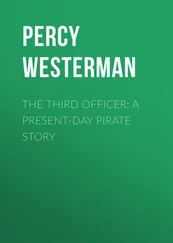(b) That the other person has nothing to say that you want to hear and you know you will be bored?
(c) That neither of you has anything to say and therefore the world will come to an end, or rather, something worse than the end of the world, or, as Carson would say, panic city — that is, a predicament in which all options open to you are more intolerable than the end of the world?
(d) That there are only two means of escape, both of which are intolerable: either you leave, which will hurt the other person’s feelings, or the other person leaves, which will hurt your feelings?
(e) That you will be exposed, that is, that the unique unformulability, the singular nought, which you secretly believe yourself to be, will be exposed at last, the one black hole among a billion other ordinary stars?
(CHECK ONE)
Thought Experiment: Imagine that you are Johnny Carson and find yourself caught in an intolerable one-on-one conversation at a cocktail party from which there is no escape.
Which of the two following events would you prefer to take place: (1) That the other person become more and more witty and charming, the music more beautiful, the scene transformed to a villa at Capri on the loveliest night of the year, while you find yourself more and more at a loss; or (2) that you are still in Beverly Hills and the chandeliers begin to rattle, a 7.5 Richter earthquake takes place, and presently you find yourself and the other person alive and well, and talking under a mound of rubble.
If your choice is (2), explain why it is possible for a true conversation to take place under the conditions of (2) but not (1).
(6) The Fearful Self (III): How the Self Tries to Escape its Predicament
QUESTION: IF YOU ARE a shy person, is it better to accept your shyness, or to seek help from a psychotherapist in order to become an assertive outgoing person, or perhaps to read a book about overcoming shyness?
(a) It is better to seek help from a psychotherapist because it is better not to suffer than to suffer. Psychiatrists and psychologists treat disorders. Shyness is a symptom of such a disorder. Therefore, it is reasonable to seek such help.
(b) It is better to read a book about how to get over being shy, anxious, insecure, and so on, than not to read such a book, because one might learn a helpful thing or two, even from a book.
(c) It is better not to read such a book because the effects of such books last only during the reading of the book and perhaps fifteen minutes after finishing it, and therefore your despair is only increased.
(d) It is better to listen to Leo Buscaglia, because he speaks of such things as love, hugging, and being open to people.
(e) It is better not to listen to Leo Buscaglia, because though Leo’s entertaining, both you and Leo are going to feel worse afterward.
(f) It is better to read the book you are presently reading, though not much better, because it does not tell you how to get over shyness, anxiety, and such, but only raises them as subjects between writer and reader and renders the unformulable formulable, for a while perhaps even tolerable.
(g) It is better not to seek help from a psychotherapist but to accept your shyness, painful though it is, because it is better to be your shy self than the sort of person the psychotherapist may want you to become, i.e., like the psychotherapist.
(h) It is better to seek help from a psychotherapist if the psychotherapist knows what not many psychotherapists know, namely, that the shy person may know something the non-shy person does not know, that your self is indeed unformulable to yourself, that you are entitled to your shyness, that, indeed, varying degrees of idiocy are required not to be shy, that the very unformulability of your self is the only clue you have to the uniqueness of yourself, that otherwise one will become yet another Ralph among a thousand Ralphs, or worse still, become an imitation of the psychotherapist.
(CHECK ONE)
Thought Experiment: In which of the two following situations would you find yourself more shy?
(1) Addressing an audience of 500 of your fellow townsmen
(2) Journeying to the Valley of the Blind, described in H. G. Wells’s story, and addressing 500 strange people who cannot see you
Explain your choice.
Thought Experiment (II): You are invited to a party. You have a choice of going as any one of these four people. Which would you choose?
(a) Mickey Rooney, who (let us say) is not shy (though who knows for sure?), who comes into a room like a tornado
(b) Johnny Carson, who is terrified, who sidles along the wall in dark glasses hoping no one will speak to him and then is miserable because no one speaks to him
(c) Yourself, who is shy and don’t think you should be, therefore you spend all your energy concealing your terrible malady and trying to figure out how to correct it
(d) Yourself, who is shy, but who knows you’re entitled and that everyone else is likely to be in the same fix, and who therefore accepts it like a prisoner thrown into the drunk tank with ten other people all strange to each other — which is what in fact you all are — and so are free to gaze at the others with a mild curiosity and free to ask simple-minded questions and make simple-minded requests, such as: What are you doing here? or: I notice you seem a little uptight and are breathing shallow — come over here, I’ll put my hand on your diaphragm, take a deep breath; or: Let me tell you something interesting that happened to me today — nothing; or: My head is killing me, would you mind massaging my neck? or: My name is Jon Johnson and I come from Wisconsin — that’s a fact — and I’m wondering whether I made a mistake in leaving, so I’m having two quick drinks, can I fix you two? or: You’re good-looking and since there is clearly nothing for us to talk about, would you care to step outside to my car and fool around?
(CHECK ONE)
(7) The Misplaced Self: How Two Selves Confronting Each Other can Miscalculate, Each Attributing a Putative and Spurious Reality to the Other and Trying to Match it, with the Consequence that Both Selves Become Non-selves
A FILMMAKER REPORTED the following experience with his film company, especially the actors, while on location in a small Midwestern town.
The townspeople showed a tremendous excitement about the presence of the film company in their midst. Not only did they make the town and even their homes available to the film crew, allowing their very lives to be disrupted, some town folk even expressed the strongest possible desire to be in the film, if only in the most insignificant roles. A quiet woman, the librarian, said that it would be the greatest event of her life.
The actors also enjoyed their stay in the town and the attention they were getting. Even though they, the actors, were not held in the highest regard by the filmmakers — producers, directors, cinematographers, etc. — were in fact often referred to by the latter as “pieces of meat,” “talking faces,” “hollow heads” among other uncomplimentary expressions — they, the actors, found themselves playing enjoyable roles in the town. What roles? They were playing the roles of the superb human beings the town folk believed them to be. Everyone in town remarked what nice people they were. So they became nice. They became nicer than saints. One famous actress in particular, noted for her childish and difficult ways, became a very model of friendliness and graciousness, astounding even the film crew and the town folk by her small acts of kindness, such as inquiring after the health of a stagehand’s sick child, remembering the name of the A & P checkout lady.
Читать дальше












